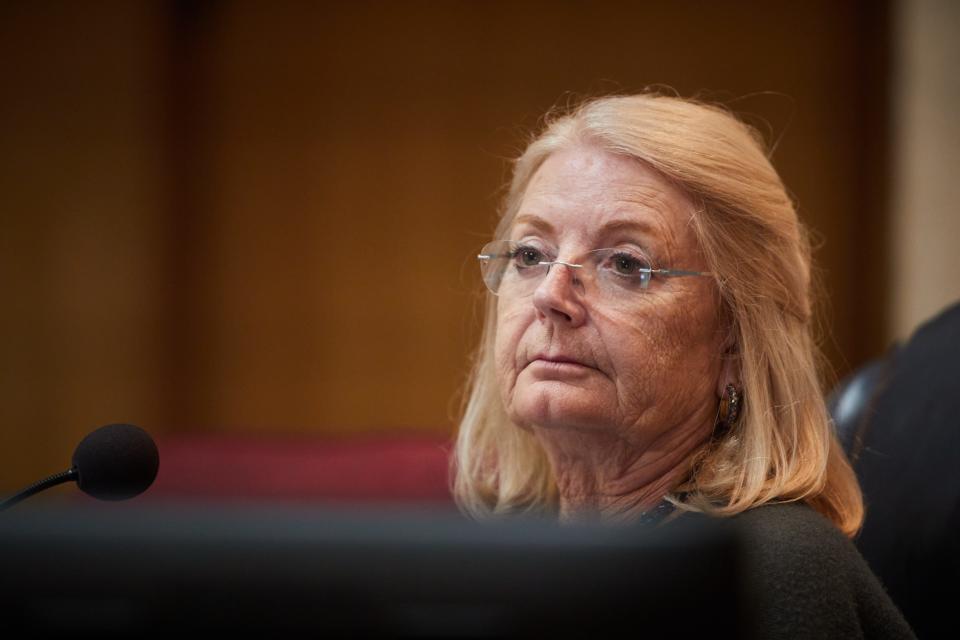As judge puts final nail in coffin of voter-approved education tax, focus turns to cap on K-12 funding
The judge overseeing the long-running battle over a voter-approved tax increase for education officially buried it this week, setting the stage for possible action on raising the spending limit for public schools.
However, there is little appetite among lawmakers to come back to the Capitol to tackle the spending cap. Unless they do, schools can't spend much of the historic increase in K-12 funding that lawmakers approved just one month ago.
If that disinterest holds, Arizona's district schools could face deep cuts early next spring to ensure their collective spending is beneath a constitutional spending cap. It would repeat the cliffhanger that happened early this year, as lawmakers waited until days before a March 1 deadline to waive what is known as the "aggregate expenditure limit."

Chuck Essigs, director of governmental relations for the Arizona Association of School Budget Officials, said early projections show the cuts could amount to $1.5 billion, which averages to a $2,000 reduction in spending per pupil.
"It's worse than this year's cliffhanger because the amount is bigger," he said. This year, the estimate was $1.2 billion, or $1,700 per student.
Republican leaders have acknowledged the waiver is needed for schools to take advantage of the $1 billion boost in funding, but said they first wanted ensure Proposition 208 and its increased tax rate for high income earners was dead. Once that happened, according to a "handshake deal" that was pitched in the final days of the legislative session, lawmakers could return in a special session to raise the cap.
The death notice came this week, when Maricopa County Superior Court Judge John Hannah issued a final judgment permanently blocking the tax increase from taking effect.
More on what could be cut: Ending classes early, axing graduations: Arizona schools face big cuts as Legislature idles
Little appetite for action to fix issue
Ben Toma, the House majority leader, on Thursday said he's wary of lifting the spending cap because public school advocates are trying to block a universal voucher expansion from taking effect.
"My vote (for more K-12 spending) was contingent on vouchers being implemented," Toma, R-Peoria, said, adding he was speaking only for himself.
But that's not what he said earlier this year. He consistently said lawmakers wouldn't consider raising the spending cap until Proposition 208 was dead.
Senate President Karen Fann, R-Prescott, said a special session is unlikely.

"I know we don't have the needed two-thirds vote for legislators to call a special session," she said in a text message. "So it would be up to the governor to bring us back in before January."
However, Ducey's spokesman said the governor has maintained there's no use in calling a special session unless he's assured the votes are there to waive the spending limit.
Supporters of Proposition 208 on Thursday said they accepted the final judgment, even as they condemned its demise as "a direct result of the Supreme Court’s partisan and legally infirm ruling." They said they saw no point in appealing the final judgment.
Stand for Children was part of the Invest in Arizona coalition that brought Proposition 208 to the ballot in 2020. In a statement, executive director Rebecca Gau said she hoped the closure of the case will allow the state to take the next step "to ensure a bright future for our students, and our economy.”
David Lujan, president and CEO of the Arizona Children's Action Alliance, another coalition member, was more direct.
"If our schools’ needs are ignored again with political games over the aggregate expenditure limit, it will be up to the voters to remove failed leadership at the ballot box," Lujan said.
The current Legislature remains in office until early January.
Who pays the legal fees?
Along with his final judgment, Hannah awarded the Republican legislative leaders who sued over Proposition 208 attorney fees of $250,000, plus $30,700 to cover the fee paid for an education finance expert's testimony.
Those costs will be picked up by state taxpayers because the GOP leaders sued the state Department of Revenue, not Invest in Arizona, to block collection of the proposition's 3.5% tax surcharge.
The surcharge would have applied to taxpayer earnings above $250,000 for single filers, or $500,000 for married couples. Voters approved it in 2020, but lawmakers and outside parties quickly moved to block it, arguing portions of the measure were unconstitutional.
Reach the reporter at maryjo.pitzl@arizonarepublic.com and follow her on Twitter @maryjpitzl.
Support local journalism. Subscribe to azcentral.com today.
This article originally appeared on Arizona Republic: AZ Proposition 208 education tax officially dead; focus moves to cap

